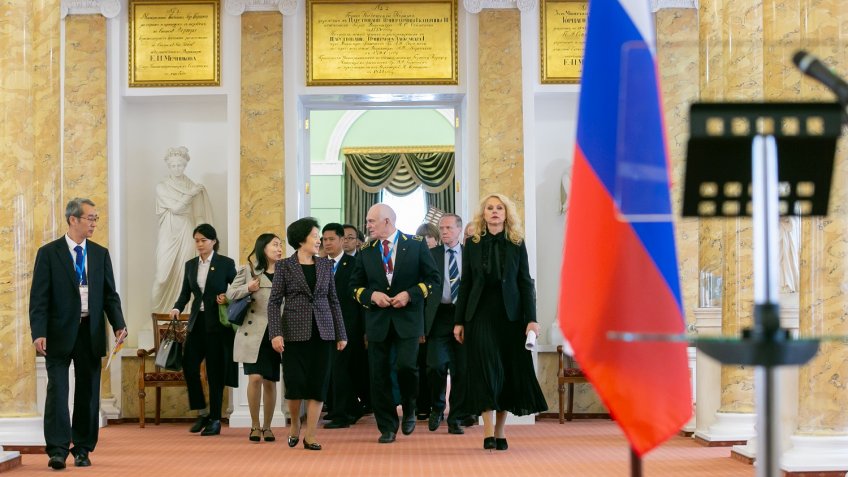
Chinese people generally value foreign education higher than the locally obtained one. However, strong demand, for the most part, remains unmet. Many Chinese went for studies to the US, but the situation has changed now. As political contradictions started affecting relationships between the two states, Chinese students decided to take their chances on other countries.
The Chinese labour market is facing difficulties at the moment, with large-scale dismissals taking place. Industrial automation, a slowdown in economic growth, reduction of over-capacities - these factors influence the market. While production workers get replaced with robots, high-qualified engineers are becoming the ones most sought-after.
As Zhao Fuming, Master's Student at the Oil & Gas Engineering Faculty in the Mining University, says "In China, I went to a private school where I studied Russian as a foreign language. In the context of the global agenda, I think it was the right decision. There are now more opportunities here compared to Europe, for the country's economy is actively growing. By the time I graduated from school, I had decided to study oil & gas. This is a sector our countries have been closely collaborating in. There is a China University of Mining and Technology I could apply for, but I wanted to study in Russia. Firstly, a diploma certificate from a foreign university is more valued. And secondly, it is almost impossible to enter that university; in fact, it is hard to gain admission to any kind of university in China".
When Zhao Fuming came to study at the Russian university, he was surprised by the lack of restrictions on the use of study and research laboratories. He also claims that in China no student is even allowed to touch the lab equipment without requesting for official permission from the principal or vice-principal. As obtaining the consent is not an easy task, university labs often stay empty. And if a Russian student wants to visit a lab for research purposes, one only has to notify the teacher.
Industrial placement practices also differ. Chinese students apply for internships once they are in their third or fourth year of study. Until then, they are only taught theoretical bases, with classes being held either at computer labs or at lecture rooms. Russian students, on the contrary, get their first field experience from the very beginning - in their first year -, which enables them to understand their career aspirations by the end of the studies.
Zhao Fuming underwent his internship - that was a part of practical training organised by the Mining University - at the Chinese CNPC and then at the Russian Lukoil. Although upon the return to China, he could apply for a job involving the development of business collaboration with Russia or Kazakhstan, he preferred to stay in St. Petersburg. In conjunction with partners, the student set up a company exporting oil & gas equipment from the People's Republic of China to the Russian Federation. They ship to Russia, among others, drilling rigs and instrument accessories made by HongHua, one of the world's leading land drilling equipment manufacturers.
Zhang Xuhuizi was born in Karamay, a city in the north of the Xinjiang Uyghur Autonomous Region. In 1955, one of the largest oil fields in China was discovered in the region, which was the primary reason for building the city. The city has grown over time into an oil-producing and refining centre. Sometime later, gas resources have also been found there.
Zhang Xuhuizi, also a student at the Mining University, explains the reasons behind her study choice "My great-grandmother was Russian, which undoubtedly affected my decision to come to study to Russia. By the time I finished school, I had already known that and decided to apply for one of the universities in St. Petersburg. In Karamay, there is someone employed in the oil & gas sector in every family. The difference is in the job title. So, I decided that the Mining University was the best option taking into consideration the shaky position of working-class and high demand for engineers. All I need is a Master's Degree to launch my career in China".
Zhao Fuming adds, "When my studies commenced, there were only 15 Chinese students at the Mining University. By now, that figure has increased several times. The university has also become more popular in my country, mostly through extensive international work. One notable example is the 24th meeting of the Russian-Chinese Commission for Humanitarian Cooperation attended by Sun Chunlan, Vice-Premier of the People's Republic of China. The meeting took place in September and was held at the premises of the Mining University".
In July, Saint-Petersburg Mining University hosts another event of international value - International Forum-Contest of Young Researchers "Topical issues of rational use of natural resources". The Forum is aimed at young scientists and students coming from the BRICS countries and is itself part of the BRICS summit. This time, over a hundred Chinese guests are expected to arrive in St. Petersburg and take part in the contest.
Since 2019, Russian high-school students can choose to take the Unified State Examination on the knowledge of the Chinese language. This initiative has been mostly supported - over three-quarters of respondents either favoured it or at least had nothing against. The rest said it was an unnecessary step. Language skills in Chinese, according to the interviewed, would be particularly useful to those who work in raw materials extraction and processing.


